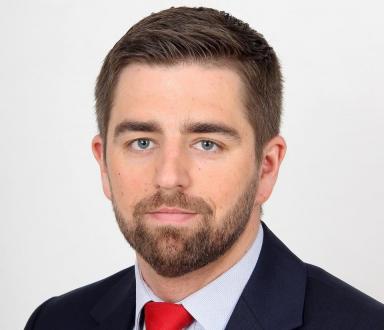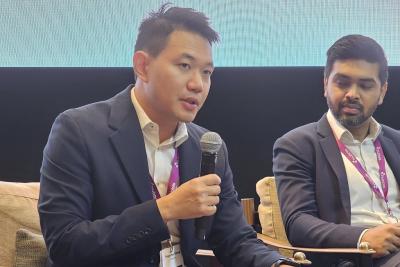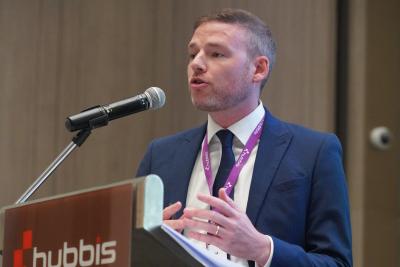Hosted by Hubbis and global professional services company Accenture, a lively and insightful private discussion took place on October 11 at the Conrad Hotel in Bangkok that focused attention on the evolving needs for an elevated and also scalable advisory proposition in Thailand’s wealth management market. Accenture is at the cutting edge of wealth management transformation globally. On its website, Accenture points out that no industry can escape digital's disruptive effect, especially not wealth management, adding that today’s clients expect a whole new kind of experience that is more informed, more personalised, more relevant and more transparent; and they want it more rapidly than ever before. An outstanding advisory proposition is central to this thrust, especially as interest in that offering is rising in the region. Accenture was represented at the discussion by both David Wilson, APAC Wealth Management Lead, and Ralf Bemmann, Principal Director, Strategy & Consulting, Capital Markets Lead for Thailand. The guests – all leaders and decision-makers within local and international private banks and asset management brands and local or regional EAMs, offered their views on an off-the-record basis. We have very briefly summarised some of those perspectives and also condensed some of the key points and pointers that David Wilson offered during the event.
Selected Observations from Wealth Management Experts in Thailand
The Catch-22 over advisory rather than the product-driven model: you need to retain your talent
A leading Thai wealth management expert pointed to the thrust that everyone is talking about to advisory and away from product-led wealth management but observed that the frontline wants incentives, and that performance is related to revenues to the organisation, otherwise talent cannot be attracted in or retained.
“If we don’t pay them properly and incentivise them, their loyalties are with the clients, not the organisation,” they observed. “Accordingly, we have to look at KPIs, customer satisfaction, AUM increase, and shift away from pure sales volume. And then we need to provide some tools, data, and information so that the frontline can give and deliver proper advice.”
A veteran private banker agreed, remarking that the independent wealth industry has risen on the back of the banks pushing products, with Singapore now beginning to emulate the success of the Swiss EAM model.
“RMs in private banks often feel they are obliged to push product,” he commented, “but I always said to our RMs don’t promote anything they do not believe in themselves, because the clients will come to you and stick with you if they believe you act in their best interests.”
And he indicated that the best bankers and best trained RMs will be more visible in the next year or two as investors hunt for alpha in challenging conditions. Panellists agreed that better training and great client centricity were key to a more robust proposition. “It is partly how we remunerate, and partly the softer skills that we need to develop,” said one guest.
The client must come first, and that is especially true in tough market conditions
Another perspective came from an asset manager who assured guests that their approach was consistently for the client to come first, and then for the RMs and ICs to offer advice based on their understanding of those clients and their deep knowledge of markets and assets.
“We then deliberate on what can we propose not only in terms of products on investment solutions, but also in terms of tools, in terms of services that will enable us to accompany our partners in creating the right ecosystem that will help them to better serve their clients,” she stated. “This is especially true in such tough conditions.”
She explained that they had in the past conducted surveys after tough market phases and found that private banking clients were perhaps less concerned about their weak portfolio performance – as that was widespread due to market conditions - than about their advisors going missing in action.
“They needed more advice from their private bank advisors during those times, and that was lacking,” she said. “Advisors need to be there talking to clients and guiding them, and from our side, we try to work in bringing relevant solutions to investment advisors and distributors.”
Navigating the lines between delivering products and advisory
Another guest observed that their approach is to elevate the understanding of the RMs/advisors around products, and then encourage more of an advisory approach centred on real expertise. Another expert agreed, adding that the wealth industry had missed a significant opportunity by not emphasising enough of the softer skills of relationship management.
“The clients need to understand that you actually care about them, that you understand their situation and their preferences and their expectations,” he said. “If they appreciate that you have listened to them and then come back to them with ideas, it is a far better footing than being product-led in approach.”
He added that it is also vital for the RMs not to pretend they know everything and advised industry participants to incline their advisors towards leveraging internal and external expertise to offer clients a more comprehensive picture of opportunities and ideas.
“If you bring to bear all of these professional resources and specialist resources, the client will appreciate that so much, and I have seen numerous examples of that in practice over many years,” he explained.
Another guest agreed, noting: “When we have six or five experts able to talk to the client, that will make the relationship very much stronger, and they really appreciate the expertise we can bring to the table.”
Self-directed DIY type investing falls off in more difficult conditions and RMs are in greater demand
He also reported that DPM is more in vogue with clients of late, even though performance remains weak. Another guest concurred, observing that in good times, clients tend to DIY investing and listen to many opinions from numerous sources, while in difficult times they return to ask more advice from the RMs. “Accordingly, the biggest issue we have right now is the RMs do not have enough time to meet or liaise with clients, so we need more RMs essentially during these moments.”
Careful segmentation is essential to ensure the right level of resources and expertise is delivered to the right clients
A guest highlighted the significant difference in approach required between UHNW, HNW and mass affluent clients. They noted that their RMs have to deliver a very hands-on and dedicated service to the smaller number of wealthiest clients, while other RMs aim to handle some 250 mass affluent clients, therefore requiring more automation and more RM-empowering digital tools.
At the same time, she reported that they have encouraged more clients to allocate towards DPM in the past two years or so, with clients gently directed toward that with the right fees and also with RMs helping them develop a better appreciation of relative performance of different approaches.
Scale is required and automation vital, especially to handle the expanding ranks of mass affluent clients
A guest highlighted the need for greater automation, especially for banks and firms catering to the expanding ranks of mass affluent clients. He said the more advice can be delivered digitally but also in a fully personalised manner, the better, helping free up resources. “If you can master the automation and the processes, then you can achieve the right sort of balance,” he said.
Another guest agreed, noting that as more advice is needed and as more clients engage with that advisory offering, the more challenge there is on resources. “At that point, it is often better to encourage clients towards DPM,” she said. “In fact, in Europe, we have developed is fully automated DPM service for distributors, where we manage literally thousands of mass affluent client portfolios automatically, complete with re-balancing automatically, especially important during volatile times.”
Key Observations & Insights from David Wilson of Accenture
David Wilson leads Accenture’s wealth management consulting business in APAC, and he is clearly deeply committed to the ongoing digitisation of the Asian wealth management industry.
He told guests that he has been in Singapore for six years and for some 14 months as lead for the consulting business for Asia covering wealth management, working with the wealth arms of retail banks, the ‘pure’ private banks, FinTechs, who operate in this space and external asset managers.
He explained that the firm had produced some major research on the industry, highlighting the shift from what has been more of a product-driven approach towards an advisory-led, portfolio-centric approach based on goals and target outcomes.
He said he was interested to hear from the assembled wealth market protagonists on how their proposition is evolving in Thailand, including around personalisation, goals-based financial planning and the client offering, and also in terms of diversification towards private markets and alternative assets, including digital assets. He explained that he was also interested to hear about the evolution of the RM, noting that a core mission for wealth management leaders in the region should be to unleash more of the productivity of the RMs and ICs with technology and other more dynamic approaches.
Accenture’s study helps point the way forward
David explained that Accenture in June had released the findings of a new survey on wealth management across eight markets in Asia, covering some 3400 clients from mass affluent individuals to UHNWIs. They had followed up with direct interviews and discussions with wealth industry leaders from global and regional private banks.
The topic was ‘advice’ and it explored how that can be tailored to the fundamentals of the clients themselves. They had approached the survey respondents to find out which of four key persona baskets they fell into.
Four key personas amongst the clientele
The first of these personas is the validator, a client who wants to have the firm or the RM intermediated in the relationship in order to help them understand goals and outcomes. These are therefore the typical advisory clients.
The second persona is the executor, who is self-directed and pursues opportunities themselves as a DIY style investor.
The third is the delegator, which is often the typical DPM client - too busy to manage their own investments, and preferring professionals to manage their money and report back to them.
And the fourth persona is the unsure client, who has no clue how to approach investments or dealing with intermediaries and advisors.
Validators (who prefer an advice-driven relationship) are the largest portion of the client base in Asia
David reported that on average across their eight chosen Asia countries, 40% are the validators, or the typical advisory clients, while in Thailand the number was slightly higher at 44%. “And interestingly,” he noted, “that figure rises the greater the wealth.”
The executor – essentially the DIY client – represents around one-third of the 3400 clients surveyed, and the delegator follows at 16%. Interestingly, the delegator leapfrogs the executor when looking at the wealthiest clients. finally there are 10% in the unsure category, meaning a significant portion of investors are simply unclear on how to approach their investments,” he remarked.
Advice therefore needs to be optimised and scaled via digital solutions
As there is a clear majority who prefer advice, David pondered how the wealth industry can deliver that properly and across the different wealth segments. “With a finite number of RMs, this clearly leads the way to the need for greater automation and more digital solutions,” he observed. “To deliver advice at scale, you need to layer in digital. That, essentially, was finding number one.”
Understanding the clients and the value of goals-based advice
The second finding is around what advice actually is. “We discovered three core elements,” he reported. “The first is goals and outcomes – essentially for clients to become ‘sticky’ you need to start with something emotive, like a goal or a lifestyle, an outcome.” He explained this is about helping them grow their wealth in general, make them more money, and also protect their assets and wealth, but also interestingly helping them focus on their businesses, and their lifestyles as well as health.
Delivering advice through the right channels, with the RM still in great demand
The second element around advice is the choice of channel. “The preference was for digital-first and RM enabled, delivered via mobile primarily but with the option to reach and engage with an RM,” David explained. “This is actually encouraging as it shows the RM is valued and remains relevant, but they need to be empowered by the right tools and supported by the right information and data at a contextual point in time to serve their clients more effectively.
Advice needs to be set against the backdrop of a comprehensive service offering by the banks
And he reported that the third element is the total proposition. “Clients almost equally want safe custody, market insights, advisory, and a deep product set, but with products as more of an outcome of the advisory process, not leading with the product.”
Understanding your client personas and steering them gently in the right direction will help the private banks become and remain the client’s primary bank
David added that if the banks or EAMs can identify what types of personas their customers are, but then see that some are not acting in the appropriate way, they can address that early by helping those clients redirect and refine their approaches.
“If you identify them early, you'll have a greater connection,” he remarked. “You can help them find the right journey, and if you do so you will get more loyalty and more assets. We know in Asia clients are multi-banked, and more so at the upper levels of wealth. We also know the primary bank gets 60% of the wealth, the second bank gets 29%, the third bank gets 8%, and the others get noting. Ergo, you need to be the primary bank.”
The advisory proposition is a lynchpin to cementing and building relationships
David also observed that there is a strong correlation between being considered the primary bank and your advisory proposition. “You can get up to 11% more AUM if your clients are satisfied with your advisory proposition,” he reported. “If you can build that trusted relationship, that is anchored to client goals, the RM is better placed to say they want to advise that client holistically and strive towards winning an even greater share of their AUM, what we call the ‘North Star’ of wealth management, in other words consolidating AUM with just one bank.”
Clients in Asia are inclined to be less loyal than might perhaps be expected, so now is a good time to elevate the advisory offering
He also reported that when they conducted the survey in January, when market conditions were far better, 10% of those surveyed had left their primary bank in the past year and 40% were thinking of doing so. And while at that time nearly 100% were happy with their investment performance, only 46% said they were satisfied with their bank.
“What that means is that amidst what was one of the best bull-market runs ever, fewer than 50% of clients were actually satisfied with their bank, which means if you're in a position to advise clients properly, plus you can deliver a seamless service, you have even more opportunity today,” he stated. “Right now, and in the foreseeable future amongst difficult market conditions, this is probably a great time to be elevating the proposition and boosting your advisory offering.”
Digital advice and the digitally empowered RM advisory offering can both work well
David then shifted his attention to delivering advice at scale for the mass affluent segment of the market. “The validator persona does not need human advice alone,” he reported. The client is a validator, this advisory persona, I'm not saying that has to be human led. They want the firm's competency skills and expertise, to help them understand options and trade off, but it can be a digitally led solution. And for DPM, it can be a digital DPM offering as well based on inputs and algorithms.”
And he added that as to RM-led advisory, the banks must identify which clients are which, so that they allocate and direct RM resources to the more productive clients, at the same time as identifying which channels they prefer for engagement.
Free up the RMs by empowering them with better automation and the latest digital tools
David reported that RMs are struggling to scale revenue because they spend 50% of their time - more actually in Thailand, he said - on non-revenue generating activities. “They all too often have to grapple with unwieldy software that they need to log in and out of all the time, which is very awkward and time consuming. With little coordination or orchestration, they become massively inefficient and that leaves them, and clients, deeply frustrated. In short, we need to give RMs the necessary tools to properly support them and elevate their capabilities and offering.”
Leverage all the tools available to deliver quality advice and a frictionless proposition
David drew his observations towards a close by highlighting the plethora of solutions emerging from the software firms and the FinTechs, many of which can help achieve a more seamless, more efficient, and more automated offering that also elevates the quality as well as the delivery of advice.
“You've really got to understand the client base, and then deliver a frictionless journey, supported by a deep product set but filtered through the lens of this goals-based journey,” he concluded.
Into the future…
“Actually, the next step for us at Accenture will be to look even deeper into how to achieve even greater scale. We already know that is only possible by even greater automation, including around next best action, next best conversation and feeding the RM only what they need to add value, whilst at the same time removing all the commodity type requirements, which are all handled automatically. In that type of future, clients will be ever better served and ever more comfortable with their RMs and the digital proposition.

Principal Director, Asia Wealth Management Lead at Accenture
More from David Wilson, Accenture
Latest Articles
Wealth Solutions & Wealth Planning
Investment Migration, Residency & Citizenship – Key Trends Relevant to HNW and UHNW Private Clients






